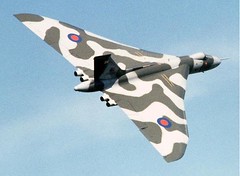
An under-told story from an under-studied (at least in the last decade) war.
The story of Vulcan 607.
"We're short of fuel, but we've come this far," he told them. "I'm not turning back now." At 290 miles away from the target, 607 began a shallow descent towards Port Stanley.Mission.
Even now they could not be certain where they were. The inflight navigation system gave two different compass readings.
The Radar Officer, Bob Wright, and the Navigator, Gordon Graham, had split the difference. If they were on course, the computer would respond with the information needed for Wright to get the bombs on target but only when the radar was switched on again - seconds before the planned drop.
Simon Baldwin in Waddington had worked out that the bomber should approach low to minimise its 'footprint' and then climb upwards to 8000 or 10,000 feet to try to stay clear of the "kill zone" of the Argentinian defences before unleashing its weaponry.
As Vulcan 607 streaked towards her target, Graham called the mileage before the rapid climb, and Hugh Prior, the electronics officer, made sure that the chaff and decoy flares, which would be fired to draw enemy fire, and the American Dash 10 detection jammer were operational.A radar contact appeared: 607 was dead on target. It was 4.30 in the morning, local time, when the Vulcan roared upwards, straight into view of the Argentine search radars. But the young radar operators were unperturbed. The bomber could only be one of theirs - this had not been a shooting war so far.
During the few minutes it took the Argentinians to wake up to the fact that this was in fact an enemy aircraft, the Vulcan had soared to its 10,000ft altitude and levelled off for the bomb run.
Its speed was 400 mph. From this moment the aircraft could not deviate, even if enemy radar was locked on them. At this height the runway would have been the size of a scratch of a fingernail on the map and the bomb run had to be precise to a few yards.
Two miles from the runway the first of the thousand-pounders fell away from the Vulcan's cavernous belly. When all 21 were away, Withers turned the Vulcan in a steep curve, in time for the crew to see a blossom of fire as the first bomb bored deep into the centre of the runway and detonated. Other blasts hit the airfield, gouging out massive chunks of its surface.
Vulcan 607 did, in fact, have enough fuel to make the rendezvous. It returned to Ascension Island and a heroes' welcome. The most ambitious sortie since World War II, had by the skin of its teeth been successful.
The damage destroyed any remaining hopes Argentine forces had of using the runway for their fast jets. Their entire Mirage fighter force had to be moved promptly back to the north of Argentina, and any jet cover during the coming British invasion would have to come from the mainland.
It shook Argentine morale to the core and provoked Galtieri's decision to order a naval offensive against the British Task Force, which had disastrous consequences for the Argentine Navy.
The V-bomber had been designed decades before to reach into the snowy wastes of Soviet Russia, but had never been used in anger. Their last outing, to a part of the world no one had dreamed they would visit, had finally justified these beautiful aircraft.
The Falklands War lasted just 74 days. Though taken by surprise, Britain launched a task force to retake the islands and after conflict costing 255 British and 649 Argentinian deaths, the Union Jack was hoisted in Port Stanley on June 14.









No comments:
Post a Comment